A Comprehensive Report on Ethics, Conduct, and Equality in Business
VerifiedAdded on 2021/05/30
|13
|3558
|24
Report
AI Summary
This report delves into ethical decision-making processes, emphasizing the importance of moral sensitivity, judgment, motivation, and character. It applies utilitarian, deontological, and virtue ethics to a moral dilemma involving theft, evaluating the ethical implications of each approach. The report also examines the Equality Act 2010, focusing on direct and indirect discrimination, positive action, and genuine occupational requirements in recruitment. Case studies illustrate the application of these principles, highlighting potential pitfalls in hiring practices. Furthermore, it outlines a code of conduct for healthcare professionals, emphasizing compassionate and safe care, and the responsibilities of managers in upholding these standards. This comprehensive analysis provides insights into navigating ethical challenges and promoting equality in professional settings. Desklib provides a platform to access similar solved assignments.
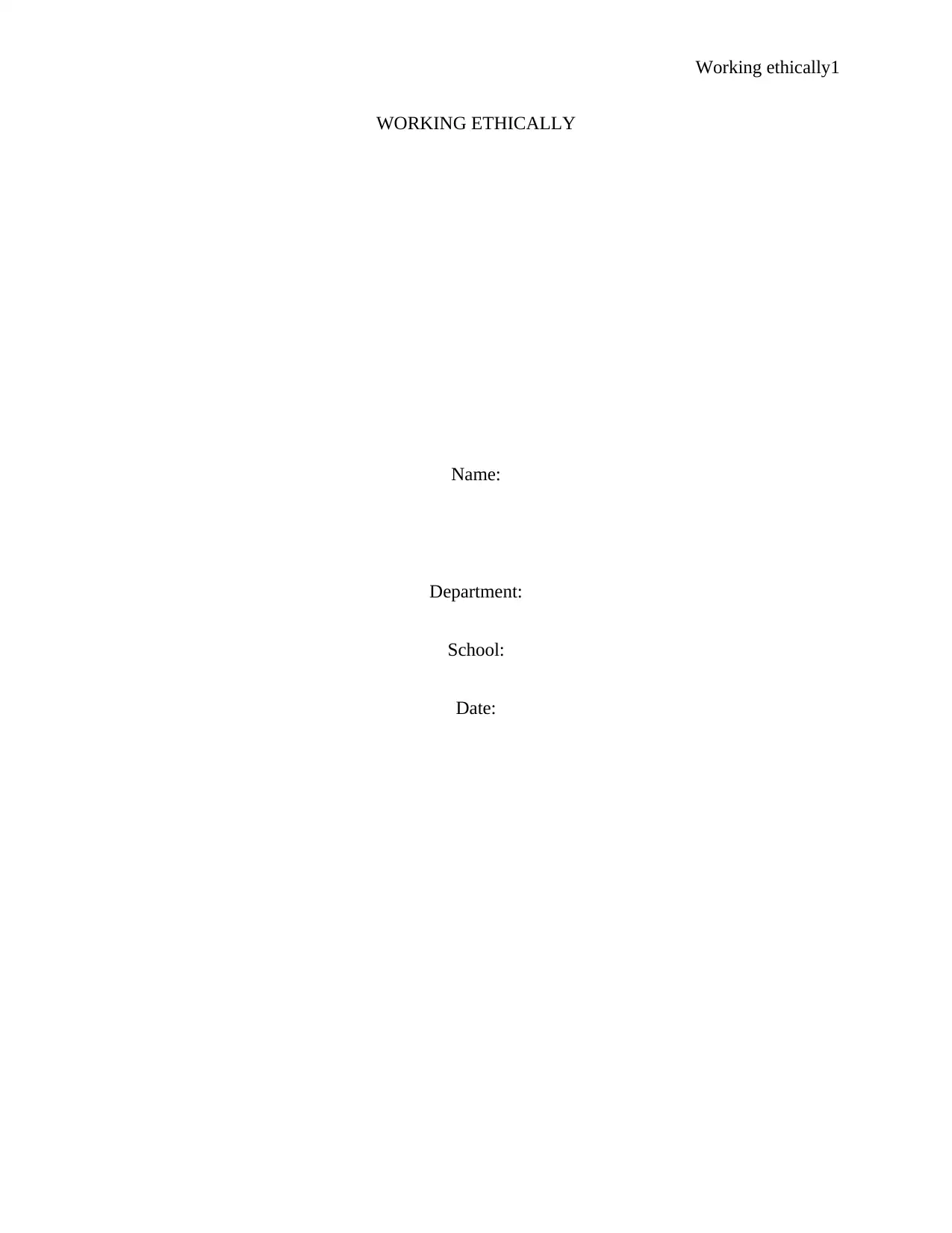
Working ethically1
WORKING ETHICALLY
Name:
Department:
School:
Date:
WORKING ETHICALLY
Name:
Department:
School:
Date:
Paraphrase This Document
Need a fresh take? Get an instant paraphrase of this document with our AI Paraphraser
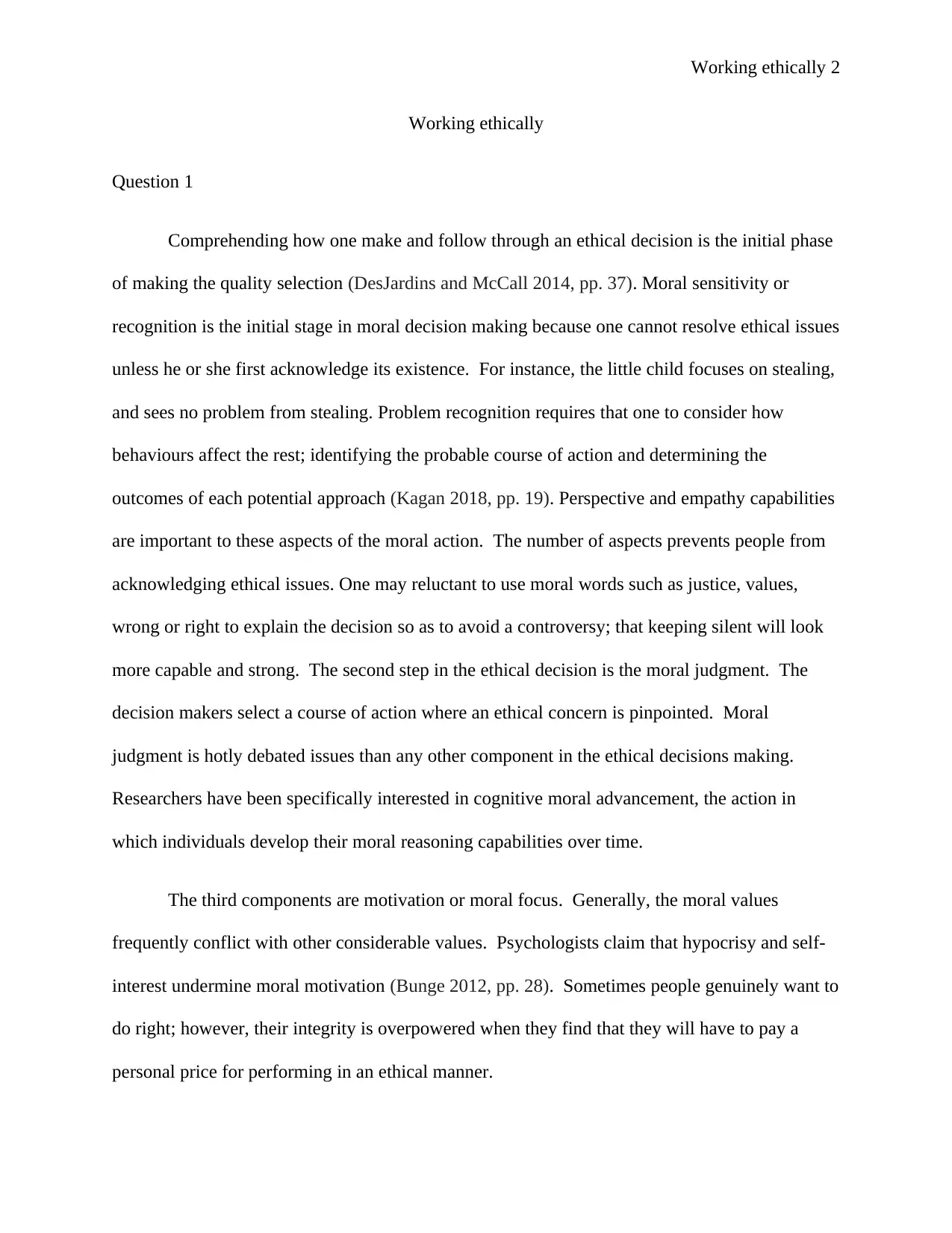
Working ethically 2
Working ethically
Question 1
Comprehending how one make and follow through an ethical decision is the initial phase
of making the quality selection (DesJardins and McCall 2014, pp. 37). Moral sensitivity or
recognition is the initial stage in moral decision making because one cannot resolve ethical issues
unless he or she first acknowledge its existence. For instance, the little child focuses on stealing,
and sees no problem from stealing. Problem recognition requires that one to consider how
behaviours affect the rest; identifying the probable course of action and determining the
outcomes of each potential approach (Kagan 2018, pp. 19). Perspective and empathy capabilities
are important to these aspects of the moral action. The number of aspects prevents people from
acknowledging ethical issues. One may reluctant to use moral words such as justice, values,
wrong or right to explain the decision so as to avoid a controversy; that keeping silent will look
more capable and strong. The second step in the ethical decision is the moral judgment. The
decision makers select a course of action where an ethical concern is pinpointed. Moral
judgment is hotly debated issues than any other component in the ethical decisions making.
Researchers have been specifically interested in cognitive moral advancement, the action in
which individuals develop their moral reasoning capabilities over time.
The third components are motivation or moral focus. Generally, the moral values
frequently conflict with other considerable values. Psychologists claim that hypocrisy and self-
interest undermine moral motivation (Bunge 2012, pp. 28). Sometimes people genuinely want to
do right; however, their integrity is overpowered when they find that they will have to pay a
personal price for performing in an ethical manner.
Working ethically
Question 1
Comprehending how one make and follow through an ethical decision is the initial phase
of making the quality selection (DesJardins and McCall 2014, pp. 37). Moral sensitivity or
recognition is the initial stage in moral decision making because one cannot resolve ethical issues
unless he or she first acknowledge its existence. For instance, the little child focuses on stealing,
and sees no problem from stealing. Problem recognition requires that one to consider how
behaviours affect the rest; identifying the probable course of action and determining the
outcomes of each potential approach (Kagan 2018, pp. 19). Perspective and empathy capabilities
are important to these aspects of the moral action. The number of aspects prevents people from
acknowledging ethical issues. One may reluctant to use moral words such as justice, values,
wrong or right to explain the decision so as to avoid a controversy; that keeping silent will look
more capable and strong. The second step in the ethical decision is the moral judgment. The
decision makers select a course of action where an ethical concern is pinpointed. Moral
judgment is hotly debated issues than any other component in the ethical decisions making.
Researchers have been specifically interested in cognitive moral advancement, the action in
which individuals develop their moral reasoning capabilities over time.
The third components are motivation or moral focus. Generally, the moral values
frequently conflict with other considerable values. Psychologists claim that hypocrisy and self-
interest undermine moral motivation (Bunge 2012, pp. 28). Sometimes people genuinely want to
do right; however, their integrity is overpowered when they find that they will have to pay a
personal price for performing in an ethical manner.
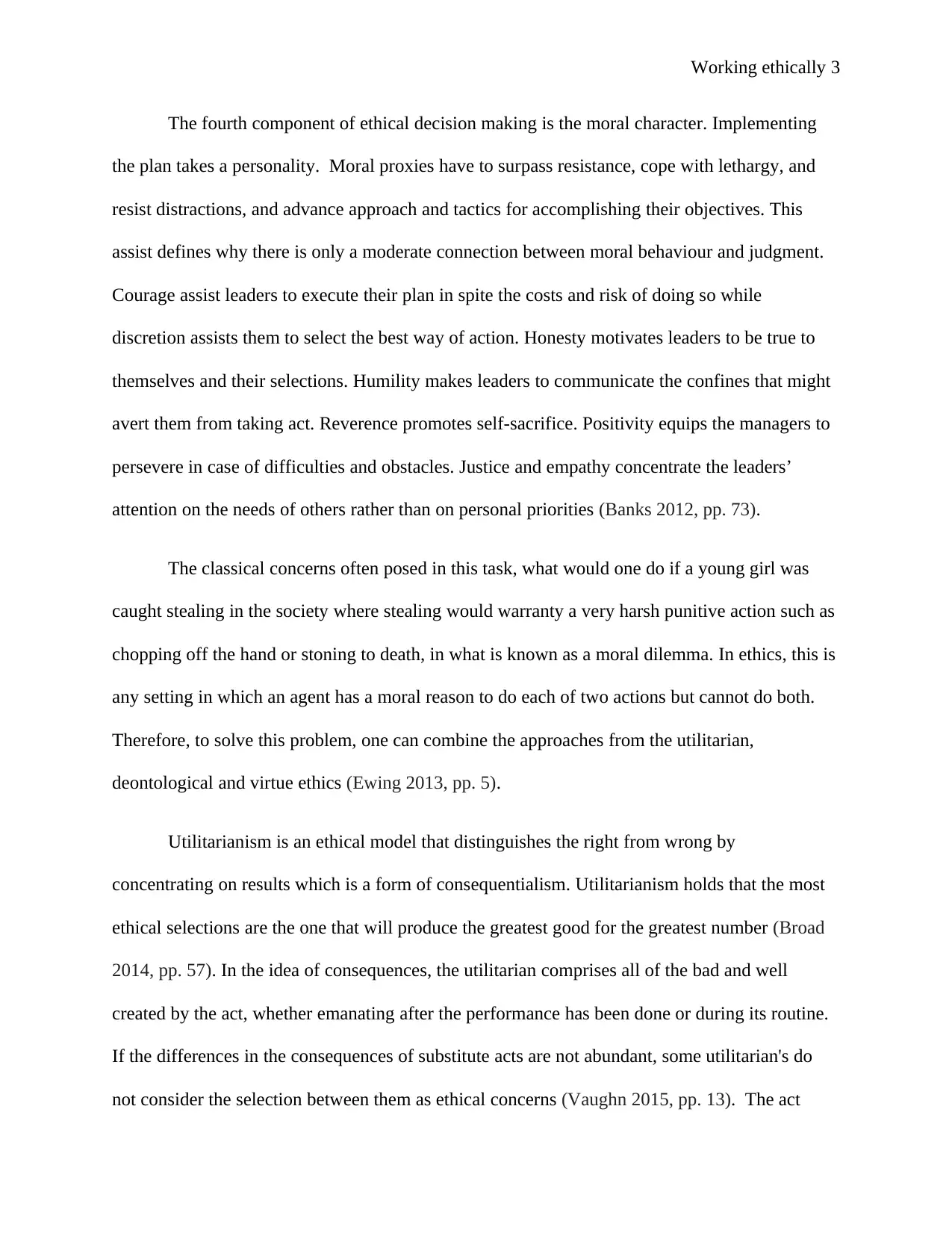
Working ethically 3
The fourth component of ethical decision making is the moral character. Implementing
the plan takes a personality. Moral proxies have to surpass resistance, cope with lethargy, and
resist distractions, and advance approach and tactics for accomplishing their objectives. This
assist defines why there is only a moderate connection between moral behaviour and judgment.
Courage assist leaders to execute their plan in spite the costs and risk of doing so while
discretion assists them to select the best way of action. Honesty motivates leaders to be true to
themselves and their selections. Humility makes leaders to communicate the confines that might
avert them from taking act. Reverence promotes self-sacrifice. Positivity equips the managers to
persevere in case of difficulties and obstacles. Justice and empathy concentrate the leaders’
attention on the needs of others rather than on personal priorities (Banks 2012, pp. 73).
The classical concerns often posed in this task, what would one do if a young girl was
caught stealing in the society where stealing would warranty a very harsh punitive action such as
chopping off the hand or stoning to death, in what is known as a moral dilemma. In ethics, this is
any setting in which an agent has a moral reason to do each of two actions but cannot do both.
Therefore, to solve this problem, one can combine the approaches from the utilitarian,
deontological and virtue ethics (Ewing 2013, pp. 5).
Utilitarianism is an ethical model that distinguishes the right from wrong by
concentrating on results which is a form of consequentialism. Utilitarianism holds that the most
ethical selections are the one that will produce the greatest good for the greatest number (Broad
2014, pp. 57). In the idea of consequences, the utilitarian comprises all of the bad and well
created by the act, whether emanating after the performance has been done or during its routine.
If the differences in the consequences of substitute acts are not abundant, some utilitarian's do
not consider the selection between them as ethical concerns (Vaughn 2015, pp. 13). The act
The fourth component of ethical decision making is the moral character. Implementing
the plan takes a personality. Moral proxies have to surpass resistance, cope with lethargy, and
resist distractions, and advance approach and tactics for accomplishing their objectives. This
assist defines why there is only a moderate connection between moral behaviour and judgment.
Courage assist leaders to execute their plan in spite the costs and risk of doing so while
discretion assists them to select the best way of action. Honesty motivates leaders to be true to
themselves and their selections. Humility makes leaders to communicate the confines that might
avert them from taking act. Reverence promotes self-sacrifice. Positivity equips the managers to
persevere in case of difficulties and obstacles. Justice and empathy concentrate the leaders’
attention on the needs of others rather than on personal priorities (Banks 2012, pp. 73).
The classical concerns often posed in this task, what would one do if a young girl was
caught stealing in the society where stealing would warranty a very harsh punitive action such as
chopping off the hand or stoning to death, in what is known as a moral dilemma. In ethics, this is
any setting in which an agent has a moral reason to do each of two actions but cannot do both.
Therefore, to solve this problem, one can combine the approaches from the utilitarian,
deontological and virtue ethics (Ewing 2013, pp. 5).
Utilitarianism is an ethical model that distinguishes the right from wrong by
concentrating on results which is a form of consequentialism. Utilitarianism holds that the most
ethical selections are the one that will produce the greatest good for the greatest number (Broad
2014, pp. 57). In the idea of consequences, the utilitarian comprises all of the bad and well
created by the act, whether emanating after the performance has been done or during its routine.
If the differences in the consequences of substitute acts are not abundant, some utilitarian's do
not consider the selection between them as ethical concerns (Vaughn 2015, pp. 13). The act
⊘ This is a preview!⊘
Do you want full access?
Subscribe today to unlock all pages.

Trusted by 1+ million students worldwide
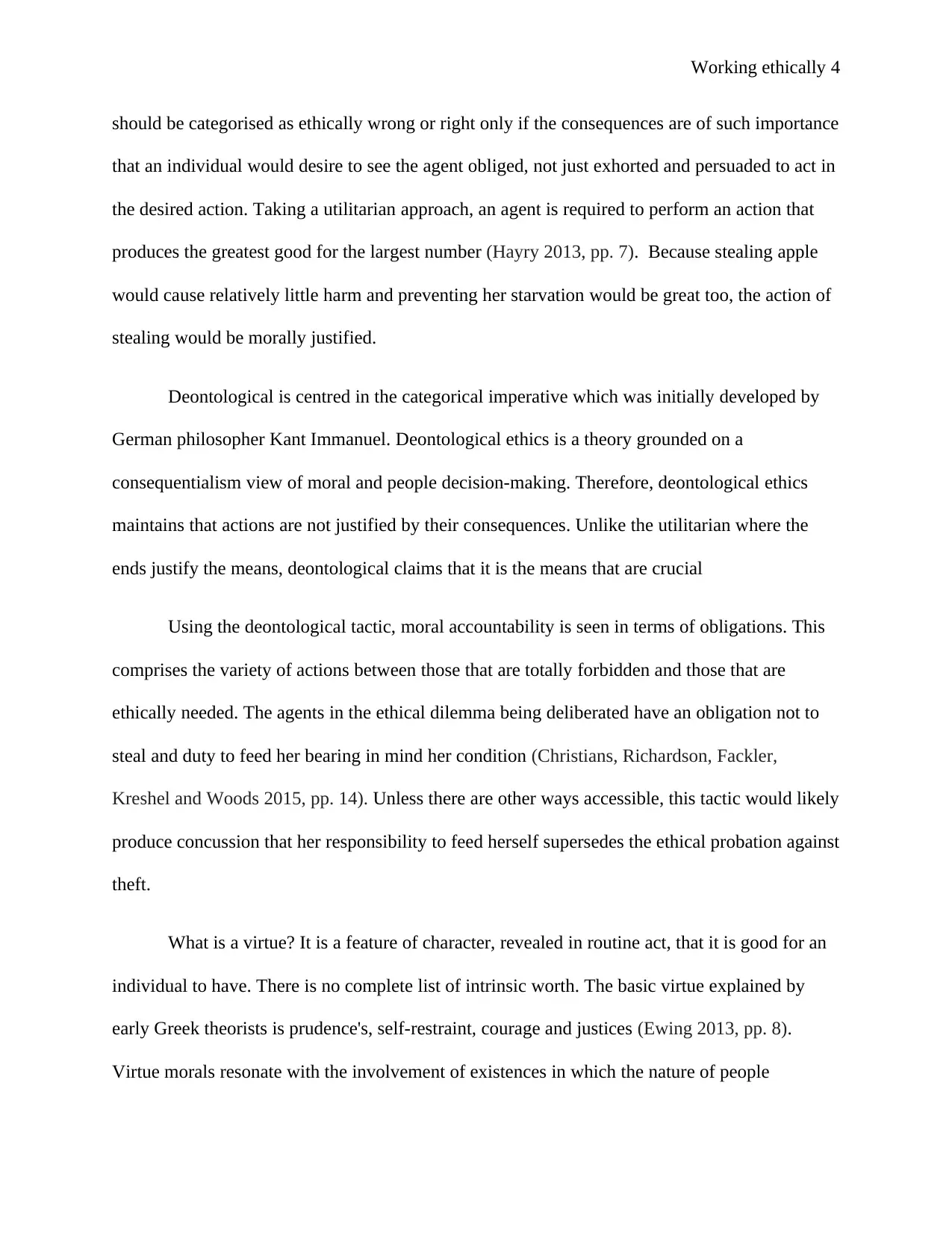
Working ethically 4
should be categorised as ethically wrong or right only if the consequences are of such importance
that an individual would desire to see the agent obliged, not just exhorted and persuaded to act in
the desired action. Taking a utilitarian approach, an agent is required to perform an action that
produces the greatest good for the largest number (Hayry 2013, pp. 7). Because stealing apple
would cause relatively little harm and preventing her starvation would be great too, the action of
stealing would be morally justified.
Deontological is centred in the categorical imperative which was initially developed by
German philosopher Kant Immanuel. Deontological ethics is a theory grounded on a
consequentialism view of moral and people decision-making. Therefore, deontological ethics
maintains that actions are not justified by their consequences. Unlike the utilitarian where the
ends justify the means, deontological claims that it is the means that are crucial
Using the deontological tactic, moral accountability is seen in terms of obligations. This
comprises the variety of actions between those that are totally forbidden and those that are
ethically needed. The agents in the ethical dilemma being deliberated have an obligation not to
steal and duty to feed her bearing in mind her condition (Christians, Richardson, Fackler,
Kreshel and Woods 2015, pp. 14). Unless there are other ways accessible, this tactic would likely
produce concussion that her responsibility to feed herself supersedes the ethical probation against
theft.
What is a virtue? It is a feature of character, revealed in routine act, that it is good for an
individual to have. There is no complete list of intrinsic worth. The basic virtue explained by
early Greek theorists is prudence's, self-restraint, courage and justices (Ewing 2013, pp. 8).
Virtue morals resonate with the involvement of existences in which the nature of people
should be categorised as ethically wrong or right only if the consequences are of such importance
that an individual would desire to see the agent obliged, not just exhorted and persuaded to act in
the desired action. Taking a utilitarian approach, an agent is required to perform an action that
produces the greatest good for the largest number (Hayry 2013, pp. 7). Because stealing apple
would cause relatively little harm and preventing her starvation would be great too, the action of
stealing would be morally justified.
Deontological is centred in the categorical imperative which was initially developed by
German philosopher Kant Immanuel. Deontological ethics is a theory grounded on a
consequentialism view of moral and people decision-making. Therefore, deontological ethics
maintains that actions are not justified by their consequences. Unlike the utilitarian where the
ends justify the means, deontological claims that it is the means that are crucial
Using the deontological tactic, moral accountability is seen in terms of obligations. This
comprises the variety of actions between those that are totally forbidden and those that are
ethically needed. The agents in the ethical dilemma being deliberated have an obligation not to
steal and duty to feed her bearing in mind her condition (Christians, Richardson, Fackler,
Kreshel and Woods 2015, pp. 14). Unless there are other ways accessible, this tactic would likely
produce concussion that her responsibility to feed herself supersedes the ethical probation against
theft.
What is a virtue? It is a feature of character, revealed in routine act, that it is good for an
individual to have. There is no complete list of intrinsic worth. The basic virtue explained by
early Greek theorists is prudence's, self-restraint, courage and justices (Ewing 2013, pp. 8).
Virtue morals resonate with the involvement of existences in which the nature of people
Paraphrase This Document
Need a fresh take? Get an instant paraphrase of this document with our AI Paraphraser
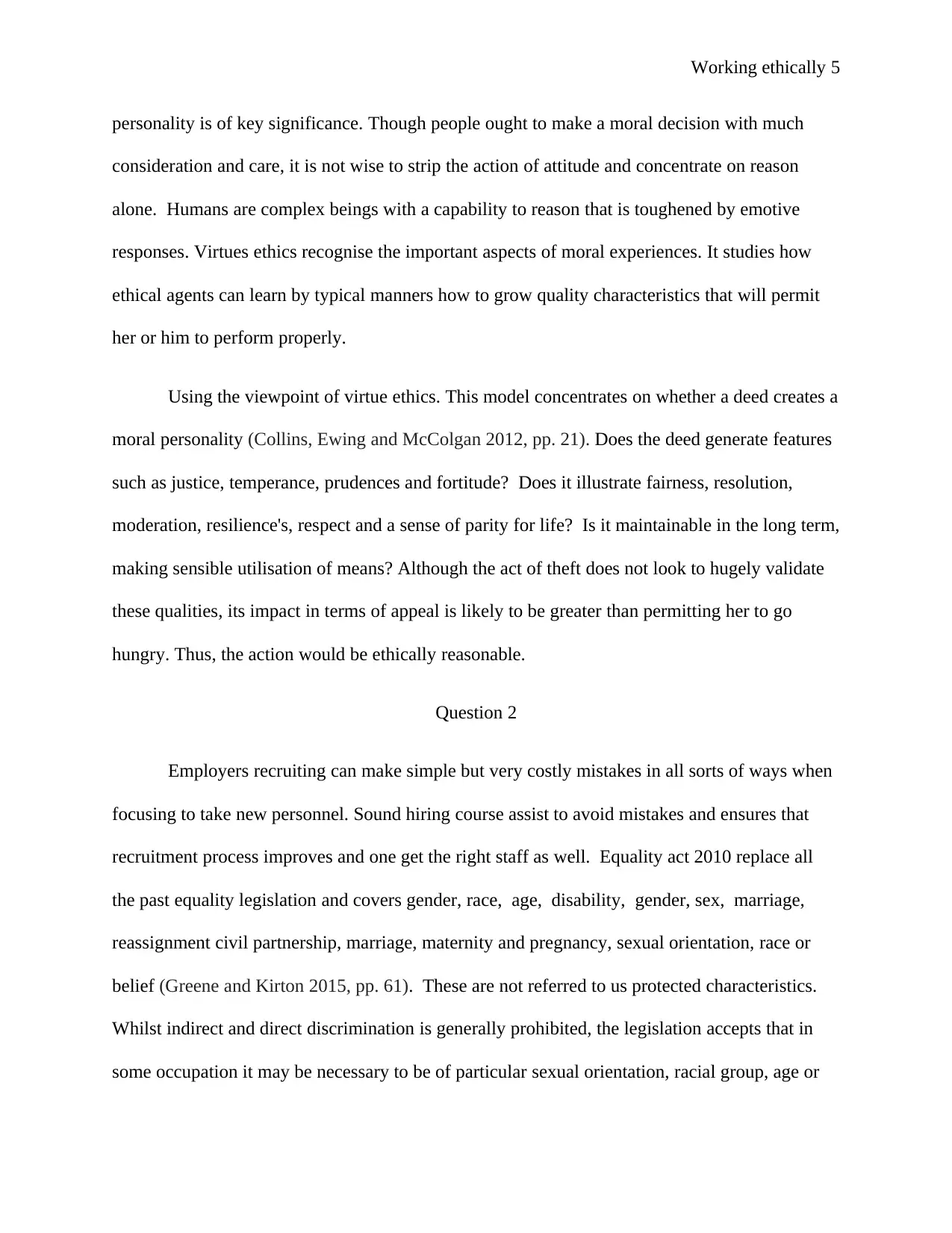
Working ethically 5
personality is of key significance. Though people ought to make a moral decision with much
consideration and care, it is not wise to strip the action of attitude and concentrate on reason
alone. Humans are complex beings with a capability to reason that is toughened by emotive
responses. Virtues ethics recognise the important aspects of moral experiences. It studies how
ethical agents can learn by typical manners how to grow quality characteristics that will permit
her or him to perform properly.
Using the viewpoint of virtue ethics. This model concentrates on whether a deed creates a
moral personality (Collins, Ewing and McColgan 2012, pp. 21). Does the deed generate features
such as justice, temperance, prudences and fortitude? Does it illustrate fairness, resolution,
moderation, resilience's, respect and a sense of parity for life? Is it maintainable in the long term,
making sensible utilisation of means? Although the act of theft does not look to hugely validate
these qualities, its impact in terms of appeal is likely to be greater than permitting her to go
hungry. Thus, the action would be ethically reasonable.
Question 2
Employers recruiting can make simple but very costly mistakes in all sorts of ways when
focusing to take new personnel. Sound hiring course assist to avoid mistakes and ensures that
recruitment process improves and one get the right staff as well. Equality act 2010 replace all
the past equality legislation and covers gender, race, age, disability, gender, sex, marriage,
reassignment civil partnership, marriage, maternity and pregnancy, sexual orientation, race or
belief (Greene and Kirton 2015, pp. 61). These are not referred to us protected characteristics.
Whilst indirect and direct discrimination is generally prohibited, the legislation accepts that in
some occupation it may be necessary to be of particular sexual orientation, racial group, age or
personality is of key significance. Though people ought to make a moral decision with much
consideration and care, it is not wise to strip the action of attitude and concentrate on reason
alone. Humans are complex beings with a capability to reason that is toughened by emotive
responses. Virtues ethics recognise the important aspects of moral experiences. It studies how
ethical agents can learn by typical manners how to grow quality characteristics that will permit
her or him to perform properly.
Using the viewpoint of virtue ethics. This model concentrates on whether a deed creates a
moral personality (Collins, Ewing and McColgan 2012, pp. 21). Does the deed generate features
such as justice, temperance, prudences and fortitude? Does it illustrate fairness, resolution,
moderation, resilience's, respect and a sense of parity for life? Is it maintainable in the long term,
making sensible utilisation of means? Although the act of theft does not look to hugely validate
these qualities, its impact in terms of appeal is likely to be greater than permitting her to go
hungry. Thus, the action would be ethically reasonable.
Question 2
Employers recruiting can make simple but very costly mistakes in all sorts of ways when
focusing to take new personnel. Sound hiring course assist to avoid mistakes and ensures that
recruitment process improves and one get the right staff as well. Equality act 2010 replace all
the past equality legislation and covers gender, race, age, disability, gender, sex, marriage,
reassignment civil partnership, marriage, maternity and pregnancy, sexual orientation, race or
belief (Greene and Kirton 2015, pp. 61). These are not referred to us protected characteristics.
Whilst indirect and direct discrimination is generally prohibited, the legislation accepts that in
some occupation it may be necessary to be of particular sexual orientation, racial group, age or
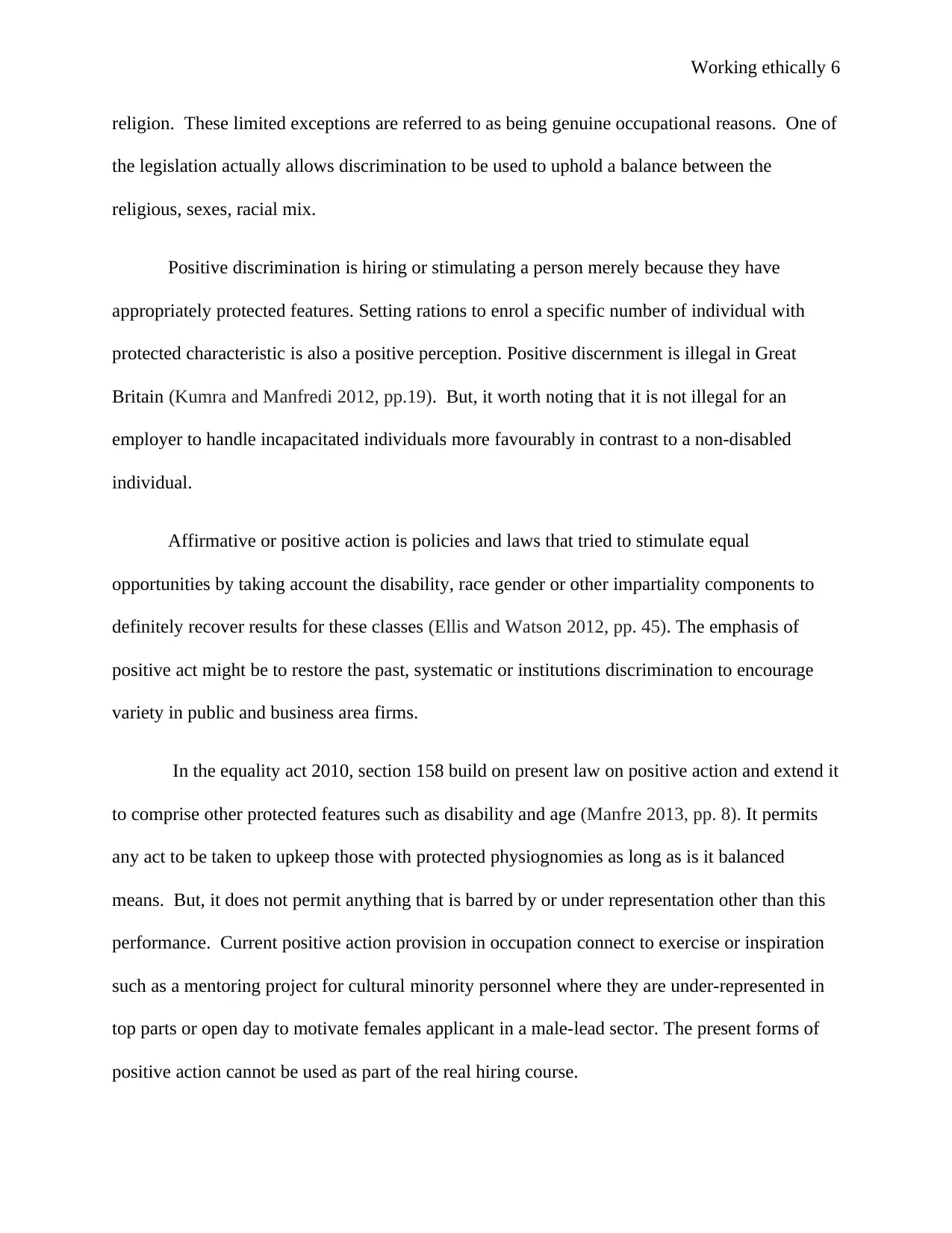
Working ethically 6
religion. These limited exceptions are referred to as being genuine occupational reasons. One of
the legislation actually allows discrimination to be used to uphold a balance between the
religious, sexes, racial mix.
Positive discrimination is hiring or stimulating a person merely because they have
appropriately protected features. Setting rations to enrol a specific number of individual with
protected characteristic is also a positive perception. Positive discernment is illegal in Great
Britain (Kumra and Manfredi 2012, pp.19). But, it worth noting that it is not illegal for an
employer to handle incapacitated individuals more favourably in contrast to a non-disabled
individual.
Affirmative or positive action is policies and laws that tried to stimulate equal
opportunities by taking account the disability, race gender or other impartiality components to
definitely recover results for these classes (Ellis and Watson 2012, pp. 45). The emphasis of
positive act might be to restore the past, systematic or institutions discrimination to encourage
variety in public and business area firms.
In the equality act 2010, section 158 build on present law on positive action and extend it
to comprise other protected features such as disability and age (Manfre 2013, pp. 8). It permits
any act to be taken to upkeep those with protected physiognomies as long as is it balanced
means. But, it does not permit anything that is barred by or under representation other than this
performance. Current positive action provision in occupation connect to exercise or inspiration
such as a mentoring project for cultural minority personnel where they are under-represented in
top parts or open day to motivate females applicant in a male-lead sector. The present forms of
positive action cannot be used as part of the real hiring course.
religion. These limited exceptions are referred to as being genuine occupational reasons. One of
the legislation actually allows discrimination to be used to uphold a balance between the
religious, sexes, racial mix.
Positive discrimination is hiring or stimulating a person merely because they have
appropriately protected features. Setting rations to enrol a specific number of individual with
protected characteristic is also a positive perception. Positive discernment is illegal in Great
Britain (Kumra and Manfredi 2012, pp.19). But, it worth noting that it is not illegal for an
employer to handle incapacitated individuals more favourably in contrast to a non-disabled
individual.
Affirmative or positive action is policies and laws that tried to stimulate equal
opportunities by taking account the disability, race gender or other impartiality components to
definitely recover results for these classes (Ellis and Watson 2012, pp. 45). The emphasis of
positive act might be to restore the past, systematic or institutions discrimination to encourage
variety in public and business area firms.
In the equality act 2010, section 158 build on present law on positive action and extend it
to comprise other protected features such as disability and age (Manfre 2013, pp. 8). It permits
any act to be taken to upkeep those with protected physiognomies as long as is it balanced
means. But, it does not permit anything that is barred by or under representation other than this
performance. Current positive action provision in occupation connect to exercise or inspiration
such as a mentoring project for cultural minority personnel where they are under-represented in
top parts or open day to motivate females applicant in a male-lead sector. The present forms of
positive action cannot be used as part of the real hiring course.
⊘ This is a preview!⊘
Do you want full access?
Subscribe today to unlock all pages.

Trusted by 1+ million students worldwide
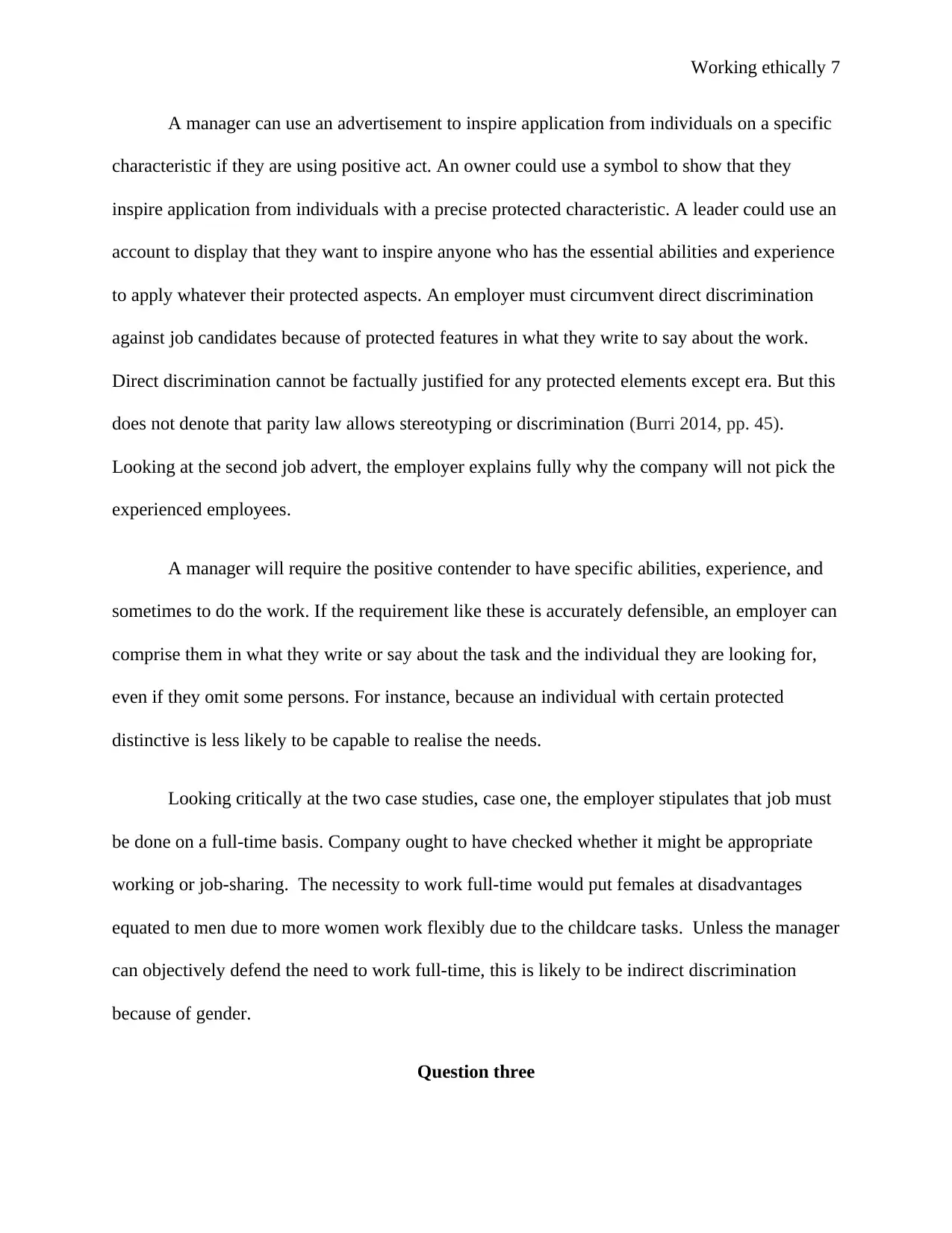
Working ethically 7
A manager can use an advertisement to inspire application from individuals on a specific
characteristic if they are using positive act. An owner could use a symbol to show that they
inspire application from individuals with a precise protected characteristic. A leader could use an
account to display that they want to inspire anyone who has the essential abilities and experience
to apply whatever their protected aspects. An employer must circumvent direct discrimination
against job candidates because of protected features in what they write to say about the work.
Direct discrimination cannot be factually justified for any protected elements except era. But this
does not denote that parity law allows stereotyping or discrimination (Burri 2014, pp. 45).
Looking at the second job advert, the employer explains fully why the company will not pick the
experienced employees.
A manager will require the positive contender to have specific abilities, experience, and
sometimes to do the work. If the requirement like these is accurately defensible, an employer can
comprise them in what they write or say about the task and the individual they are looking for,
even if they omit some persons. For instance, because an individual with certain protected
distinctive is less likely to be capable to realise the needs.
Looking critically at the two case studies, case one, the employer stipulates that job must
be done on a full-time basis. Company ought to have checked whether it might be appropriate
working or job-sharing. The necessity to work full-time would put females at disadvantages
equated to men due to more women work flexibly due to the childcare tasks. Unless the manager
can objectively defend the need to work full-time, this is likely to be indirect discrimination
because of gender.
Question three
A manager can use an advertisement to inspire application from individuals on a specific
characteristic if they are using positive act. An owner could use a symbol to show that they
inspire application from individuals with a precise protected characteristic. A leader could use an
account to display that they want to inspire anyone who has the essential abilities and experience
to apply whatever their protected aspects. An employer must circumvent direct discrimination
against job candidates because of protected features in what they write to say about the work.
Direct discrimination cannot be factually justified for any protected elements except era. But this
does not denote that parity law allows stereotyping or discrimination (Burri 2014, pp. 45).
Looking at the second job advert, the employer explains fully why the company will not pick the
experienced employees.
A manager will require the positive contender to have specific abilities, experience, and
sometimes to do the work. If the requirement like these is accurately defensible, an employer can
comprise them in what they write or say about the task and the individual they are looking for,
even if they omit some persons. For instance, because an individual with certain protected
distinctive is less likely to be capable to realise the needs.
Looking critically at the two case studies, case one, the employer stipulates that job must
be done on a full-time basis. Company ought to have checked whether it might be appropriate
working or job-sharing. The necessity to work full-time would put females at disadvantages
equated to men due to more women work flexibly due to the childcare tasks. Unless the manager
can objectively defend the need to work full-time, this is likely to be indirect discrimination
because of gender.
Question three
Paraphrase This Document
Need a fresh take? Get an instant paraphrase of this document with our AI Paraphraser
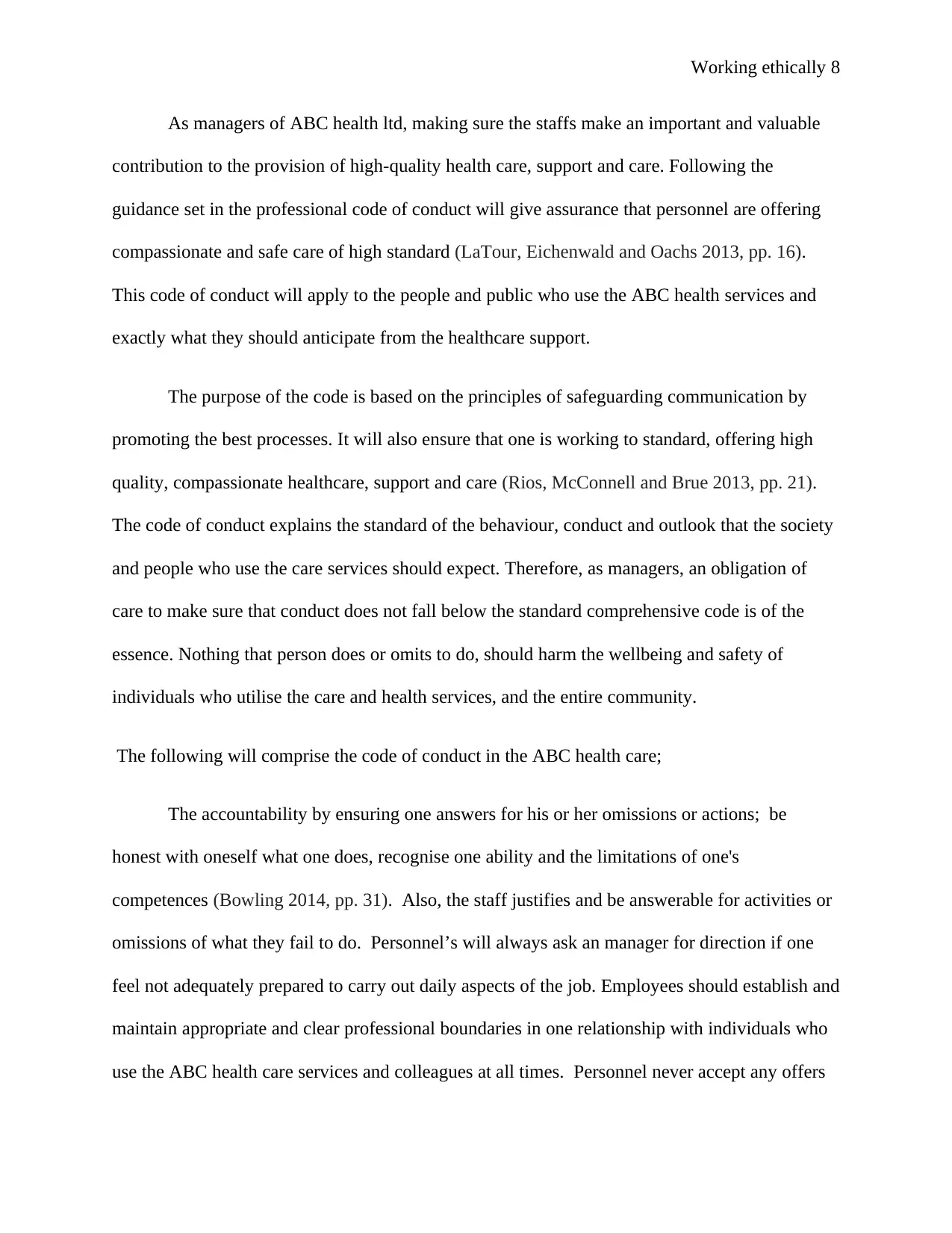
Working ethically 8
As managers of ABC health ltd, making sure the staffs make an important and valuable
contribution to the provision of high-quality health care, support and care. Following the
guidance set in the professional code of conduct will give assurance that personnel are offering
compassionate and safe care of high standard (LaTour, Eichenwald and Oachs 2013, pp. 16).
This code of conduct will apply to the people and public who use the ABC health services and
exactly what they should anticipate from the healthcare support.
The purpose of the code is based on the principles of safeguarding communication by
promoting the best processes. It will also ensure that one is working to standard, offering high
quality, compassionate healthcare, support and care (Rios, McConnell and Brue 2013, pp. 21).
The code of conduct explains the standard of the behaviour, conduct and outlook that the society
and people who use the care services should expect. Therefore, as managers, an obligation of
care to make sure that conduct does not fall below the standard comprehensive code is of the
essence. Nothing that person does or omits to do, should harm the wellbeing and safety of
individuals who utilise the care and health services, and the entire community.
The following will comprise the code of conduct in the ABC health care;
The accountability by ensuring one answers for his or her omissions or actions; be
honest with oneself what one does, recognise one ability and the limitations of one's
competences (Bowling 2014, pp. 31). Also, the staff justifies and be answerable for activities or
omissions of what they fail to do. Personnel’s will always ask an manager for direction if one
feel not adequately prepared to carry out daily aspects of the job. Employees should establish and
maintain appropriate and clear professional boundaries in one relationship with individuals who
use the ABC health care services and colleagues at all times. Personnel never accept any offers
As managers of ABC health ltd, making sure the staffs make an important and valuable
contribution to the provision of high-quality health care, support and care. Following the
guidance set in the professional code of conduct will give assurance that personnel are offering
compassionate and safe care of high standard (LaTour, Eichenwald and Oachs 2013, pp. 16).
This code of conduct will apply to the people and public who use the ABC health services and
exactly what they should anticipate from the healthcare support.
The purpose of the code is based on the principles of safeguarding communication by
promoting the best processes. It will also ensure that one is working to standard, offering high
quality, compassionate healthcare, support and care (Rios, McConnell and Brue 2013, pp. 21).
The code of conduct explains the standard of the behaviour, conduct and outlook that the society
and people who use the care services should expect. Therefore, as managers, an obligation of
care to make sure that conduct does not fall below the standard comprehensive code is of the
essence. Nothing that person does or omits to do, should harm the wellbeing and safety of
individuals who utilise the care and health services, and the entire community.
The following will comprise the code of conduct in the ABC health care;
The accountability by ensuring one answers for his or her omissions or actions; be
honest with oneself what one does, recognise one ability and the limitations of one's
competences (Bowling 2014, pp. 31). Also, the staff justifies and be answerable for activities or
omissions of what they fail to do. Personnel’s will always ask an manager for direction if one
feel not adequately prepared to carry out daily aspects of the job. Employees should establish and
maintain appropriate and clear professional boundaries in one relationship with individuals who
use the ABC health care services and colleagues at all times. Personnel never accept any offers
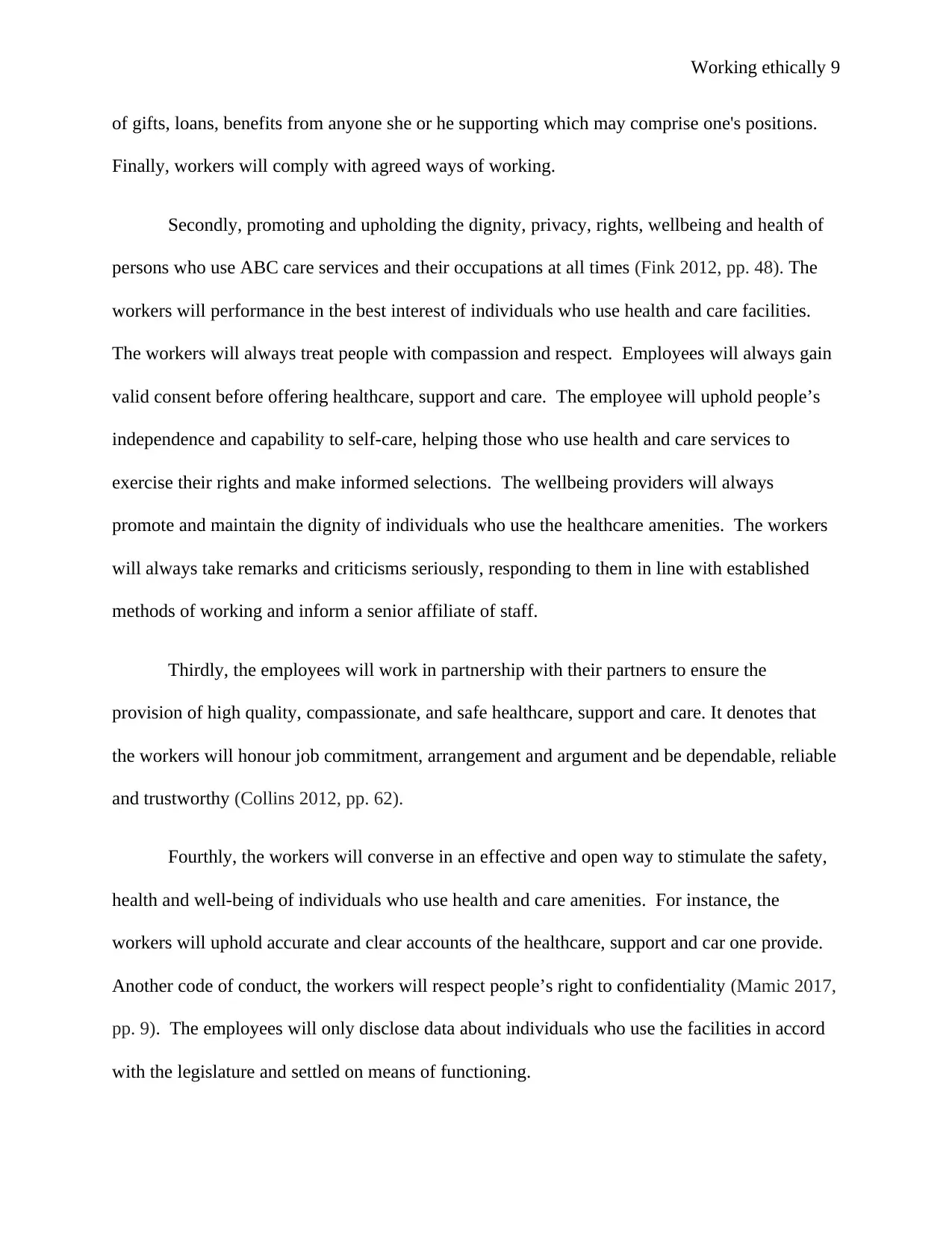
Working ethically 9
of gifts, loans, benefits from anyone she or he supporting which may comprise one's positions.
Finally, workers will comply with agreed ways of working.
Secondly, promoting and upholding the dignity, privacy, rights, wellbeing and health of
persons who use ABC care services and their occupations at all times (Fink 2012, pp. 48). The
workers will performance in the best interest of individuals who use health and care facilities.
The workers will always treat people with compassion and respect. Employees will always gain
valid consent before offering healthcare, support and care. The employee will uphold people’s
independence and capability to self-care, helping those who use health and care services to
exercise their rights and make informed selections. The wellbeing providers will always
promote and maintain the dignity of individuals who use the healthcare amenities. The workers
will always take remarks and criticisms seriously, responding to them in line with established
methods of working and inform a senior affiliate of staff.
Thirdly, the employees will work in partnership with their partners to ensure the
provision of high quality, compassionate, and safe healthcare, support and care. It denotes that
the workers will honour job commitment, arrangement and argument and be dependable, reliable
and trustworthy (Collins 2012, pp. 62).
Fourthly, the workers will converse in an effective and open way to stimulate the safety,
health and well-being of individuals who use health and care amenities. For instance, the
workers will uphold accurate and clear accounts of the healthcare, support and car one provide.
Another code of conduct, the workers will respect people’s right to confidentiality (Mamic 2017,
pp. 9). The employees will only disclose data about individuals who use the facilities in accord
with the legislature and settled on means of functioning.
of gifts, loans, benefits from anyone she or he supporting which may comprise one's positions.
Finally, workers will comply with agreed ways of working.
Secondly, promoting and upholding the dignity, privacy, rights, wellbeing and health of
persons who use ABC care services and their occupations at all times (Fink 2012, pp. 48). The
workers will performance in the best interest of individuals who use health and care facilities.
The workers will always treat people with compassion and respect. Employees will always gain
valid consent before offering healthcare, support and care. The employee will uphold people’s
independence and capability to self-care, helping those who use health and care services to
exercise their rights and make informed selections. The wellbeing providers will always
promote and maintain the dignity of individuals who use the healthcare amenities. The workers
will always take remarks and criticisms seriously, responding to them in line with established
methods of working and inform a senior affiliate of staff.
Thirdly, the employees will work in partnership with their partners to ensure the
provision of high quality, compassionate, and safe healthcare, support and care. It denotes that
the workers will honour job commitment, arrangement and argument and be dependable, reliable
and trustworthy (Collins 2012, pp. 62).
Fourthly, the workers will converse in an effective and open way to stimulate the safety,
health and well-being of individuals who use health and care amenities. For instance, the
workers will uphold accurate and clear accounts of the healthcare, support and car one provide.
Another code of conduct, the workers will respect people’s right to confidentiality (Mamic 2017,
pp. 9). The employees will only disclose data about individuals who use the facilities in accord
with the legislature and settled on means of functioning.
⊘ This is a preview!⊘
Do you want full access?
Subscribe today to unlock all pages.

Trusted by 1+ million students worldwide
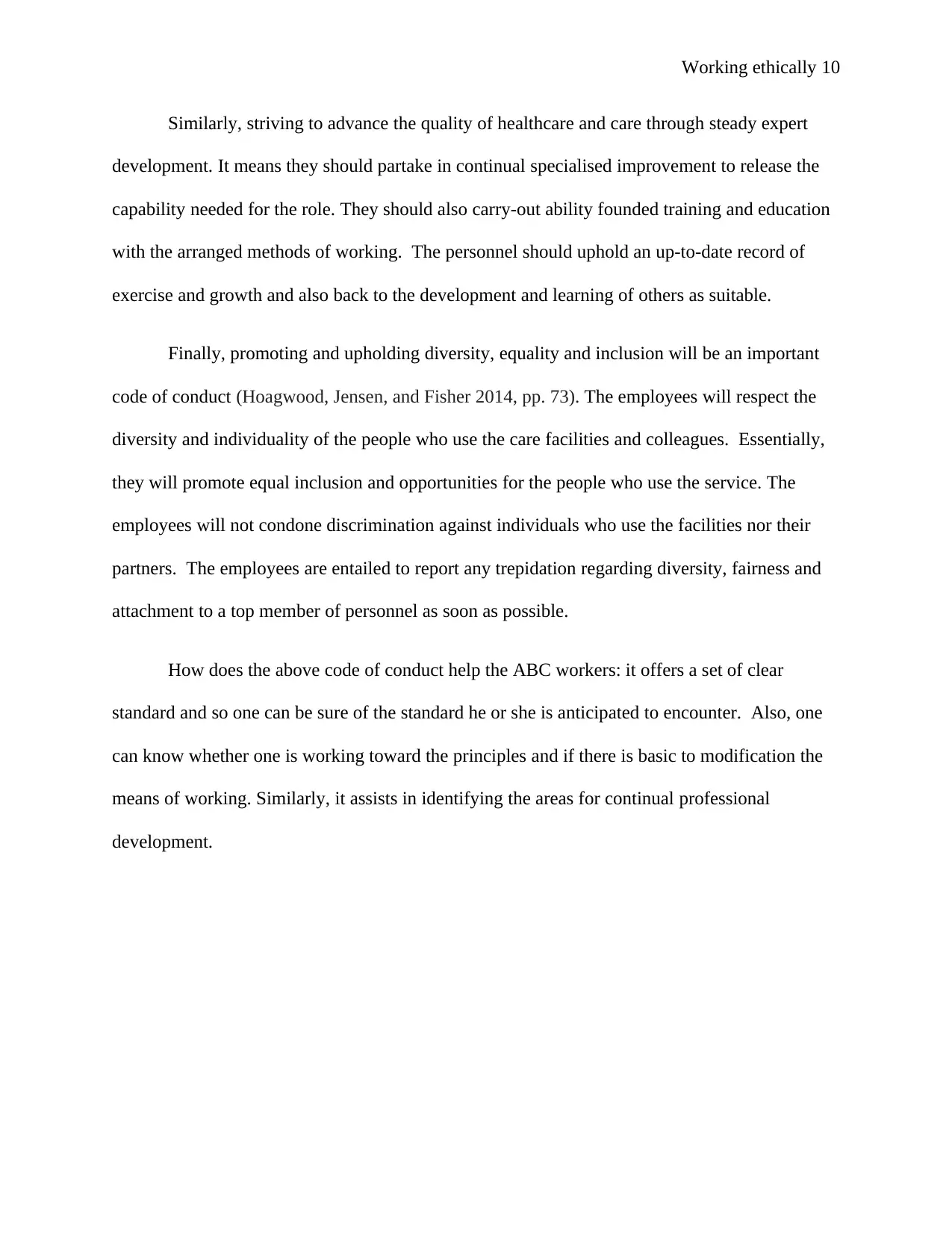
Working ethically 10
Similarly, striving to advance the quality of healthcare and care through steady expert
development. It means they should partake in continual specialised improvement to release the
capability needed for the role. They should also carry-out ability founded training and education
with the arranged methods of working. The personnel should uphold an up-to-date record of
exercise and growth and also back to the development and learning of others as suitable.
Finally, promoting and upholding diversity, equality and inclusion will be an important
code of conduct (Hoagwood, Jensen, and Fisher 2014, pp. 73). The employees will respect the
diversity and individuality of the people who use the care facilities and colleagues. Essentially,
they will promote equal inclusion and opportunities for the people who use the service. The
employees will not condone discrimination against individuals who use the facilities nor their
partners. The employees are entailed to report any trepidation regarding diversity, fairness and
attachment to a top member of personnel as soon as possible.
How does the above code of conduct help the ABC workers: it offers a set of clear
standard and so one can be sure of the standard he or she is anticipated to encounter. Also, one
can know whether one is working toward the principles and if there is basic to modification the
means of working. Similarly, it assists in identifying the areas for continual professional
development.
Similarly, striving to advance the quality of healthcare and care through steady expert
development. It means they should partake in continual specialised improvement to release the
capability needed for the role. They should also carry-out ability founded training and education
with the arranged methods of working. The personnel should uphold an up-to-date record of
exercise and growth and also back to the development and learning of others as suitable.
Finally, promoting and upholding diversity, equality and inclusion will be an important
code of conduct (Hoagwood, Jensen, and Fisher 2014, pp. 73). The employees will respect the
diversity and individuality of the people who use the care facilities and colleagues. Essentially,
they will promote equal inclusion and opportunities for the people who use the service. The
employees will not condone discrimination against individuals who use the facilities nor their
partners. The employees are entailed to report any trepidation regarding diversity, fairness and
attachment to a top member of personnel as soon as possible.
How does the above code of conduct help the ABC workers: it offers a set of clear
standard and so one can be sure of the standard he or she is anticipated to encounter. Also, one
can know whether one is working toward the principles and if there is basic to modification the
means of working. Similarly, it assists in identifying the areas for continual professional
development.
Paraphrase This Document
Need a fresh take? Get an instant paraphrase of this document with our AI Paraphraser
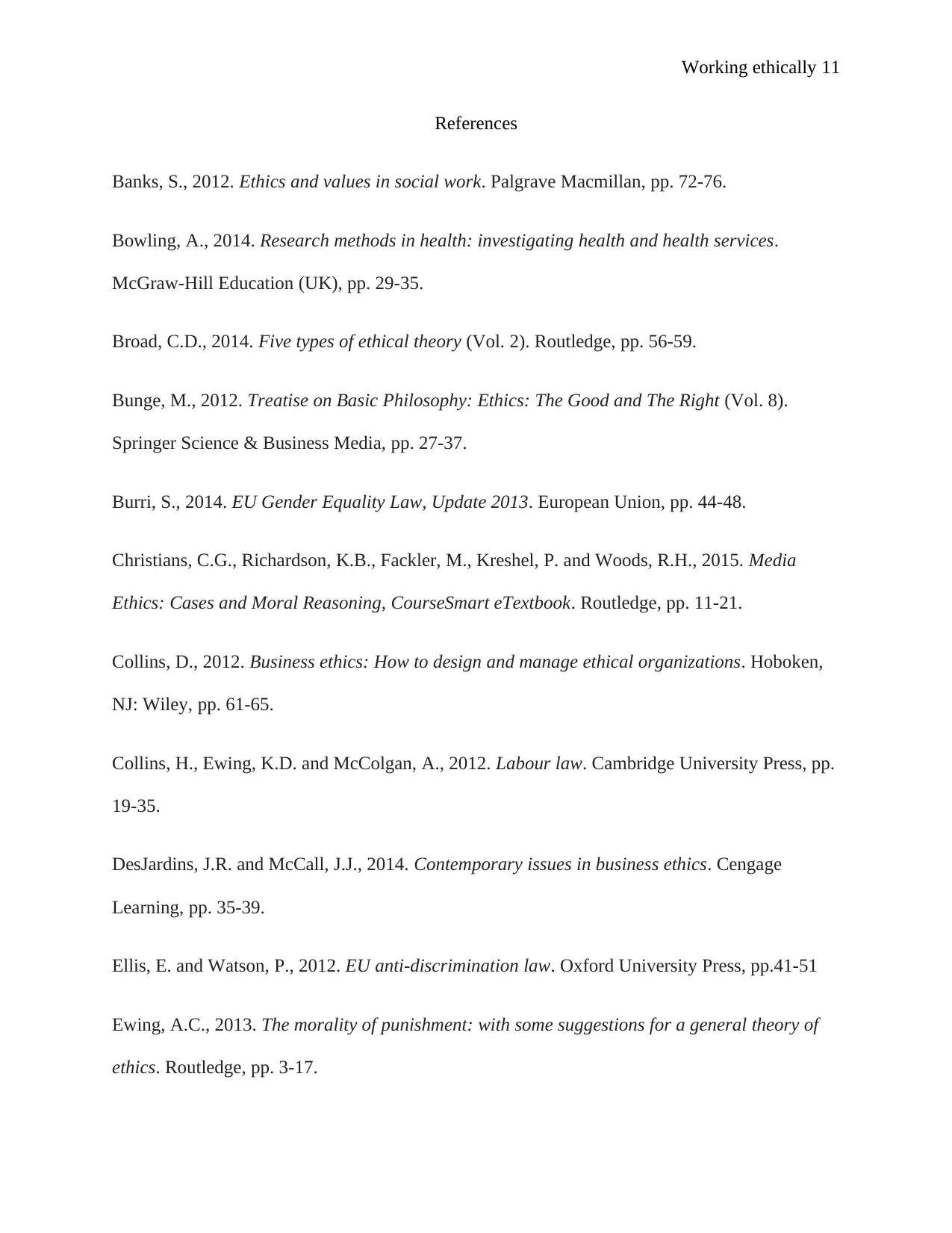
Working ethically 11
References
Banks, S., 2012. Ethics and values in social work. Palgrave Macmillan, pp. 72-76.
Bowling, A., 2014. Research methods in health: investigating health and health services.
McGraw-Hill Education (UK), pp. 29-35.
Broad, C.D., 2014. Five types of ethical theory (Vol. 2). Routledge, pp. 56-59.
Bunge, M., 2012. Treatise on Basic Philosophy: Ethics: The Good and The Right (Vol. 8).
Springer Science & Business Media, pp. 27-37.
Burri, S., 2014. EU Gender Equality Law, Update 2013. European Union, pp. 44-48.
Christians, C.G., Richardson, K.B., Fackler, M., Kreshel, P. and Woods, R.H., 2015. Media
Ethics: Cases and Moral Reasoning, CourseSmart eTextbook. Routledge, pp. 11-21.
Collins, D., 2012. Business ethics: How to design and manage ethical organizations. Hoboken,
NJ: Wiley, pp. 61-65.
Collins, H., Ewing, K.D. and McColgan, A., 2012. Labour law. Cambridge University Press, pp.
19-35.
DesJardins, J.R. and McCall, J.J., 2014. Contemporary issues in business ethics. Cengage
Learning, pp. 35-39.
Ellis, E. and Watson, P., 2012. EU anti-discrimination law. Oxford University Press, pp.41-51
Ewing, A.C., 2013. The morality of punishment: with some suggestions for a general theory of
ethics. Routledge, pp. 3-17.
References
Banks, S., 2012. Ethics and values in social work. Palgrave Macmillan, pp. 72-76.
Bowling, A., 2014. Research methods in health: investigating health and health services.
McGraw-Hill Education (UK), pp. 29-35.
Broad, C.D., 2014. Five types of ethical theory (Vol. 2). Routledge, pp. 56-59.
Bunge, M., 2012. Treatise on Basic Philosophy: Ethics: The Good and The Right (Vol. 8).
Springer Science & Business Media, pp. 27-37.
Burri, S., 2014. EU Gender Equality Law, Update 2013. European Union, pp. 44-48.
Christians, C.G., Richardson, K.B., Fackler, M., Kreshel, P. and Woods, R.H., 2015. Media
Ethics: Cases and Moral Reasoning, CourseSmart eTextbook. Routledge, pp. 11-21.
Collins, D., 2012. Business ethics: How to design and manage ethical organizations. Hoboken,
NJ: Wiley, pp. 61-65.
Collins, H., Ewing, K.D. and McColgan, A., 2012. Labour law. Cambridge University Press, pp.
19-35.
DesJardins, J.R. and McCall, J.J., 2014. Contemporary issues in business ethics. Cengage
Learning, pp. 35-39.
Ellis, E. and Watson, P., 2012. EU anti-discrimination law. Oxford University Press, pp.41-51
Ewing, A.C., 2013. The morality of punishment: with some suggestions for a general theory of
ethics. Routledge, pp. 3-17.
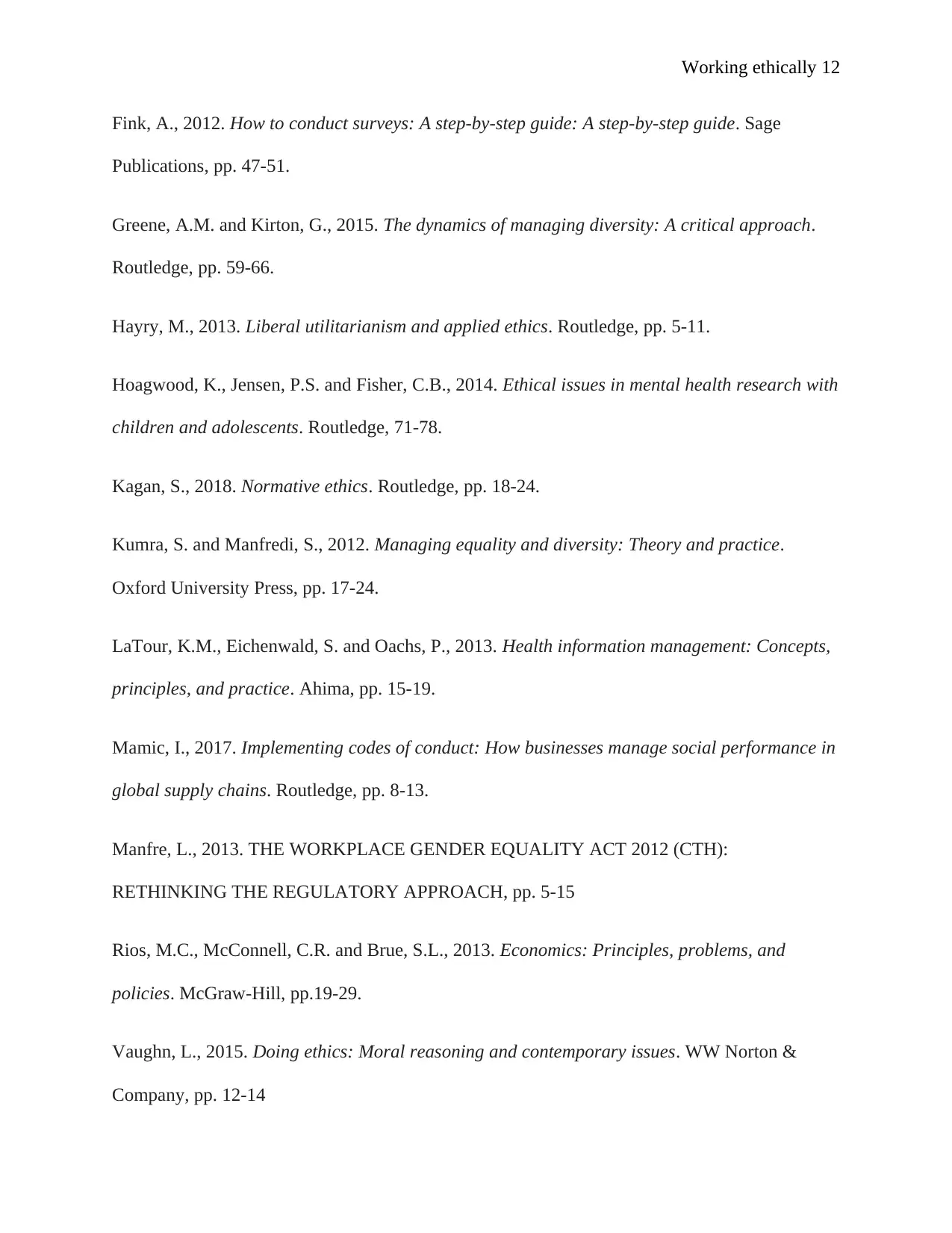
Working ethically 12
Fink, A., 2012. How to conduct surveys: A step-by-step guide: A step-by-step guide. Sage
Publications, pp. 47-51.
Greene, A.M. and Kirton, G., 2015. The dynamics of managing diversity: A critical approach.
Routledge, pp. 59-66.
Hayry, M., 2013. Liberal utilitarianism and applied ethics. Routledge, pp. 5-11.
Hoagwood, K., Jensen, P.S. and Fisher, C.B., 2014. Ethical issues in mental health research with
children and adolescents. Routledge, 71-78.
Kagan, S., 2018. Normative ethics. Routledge, pp. 18-24.
Kumra, S. and Manfredi, S., 2012. Managing equality and diversity: Theory and practice.
Oxford University Press, pp. 17-24.
LaTour, K.M., Eichenwald, S. and Oachs, P., 2013. Health information management: Concepts,
principles, and practice. Ahima, pp. 15-19.
Mamic, I., 2017. Implementing codes of conduct: How businesses manage social performance in
global supply chains. Routledge, pp. 8-13.
Manfre, L., 2013. THE WORKPLACE GENDER EQUALITY ACT 2012 (CTH):
RETHINKING THE REGULATORY APPROACH, pp. 5-15
Rios, M.C., McConnell, C.R. and Brue, S.L., 2013. Economics: Principles, problems, and
policies. McGraw-Hill, pp.19-29.
Vaughn, L., 2015. Doing ethics: Moral reasoning and contemporary issues. WW Norton &
Company, pp. 12-14
Fink, A., 2012. How to conduct surveys: A step-by-step guide: A step-by-step guide. Sage
Publications, pp. 47-51.
Greene, A.M. and Kirton, G., 2015. The dynamics of managing diversity: A critical approach.
Routledge, pp. 59-66.
Hayry, M., 2013. Liberal utilitarianism and applied ethics. Routledge, pp. 5-11.
Hoagwood, K., Jensen, P.S. and Fisher, C.B., 2014. Ethical issues in mental health research with
children and adolescents. Routledge, 71-78.
Kagan, S., 2018. Normative ethics. Routledge, pp. 18-24.
Kumra, S. and Manfredi, S., 2012. Managing equality and diversity: Theory and practice.
Oxford University Press, pp. 17-24.
LaTour, K.M., Eichenwald, S. and Oachs, P., 2013. Health information management: Concepts,
principles, and practice. Ahima, pp. 15-19.
Mamic, I., 2017. Implementing codes of conduct: How businesses manage social performance in
global supply chains. Routledge, pp. 8-13.
Manfre, L., 2013. THE WORKPLACE GENDER EQUALITY ACT 2012 (CTH):
RETHINKING THE REGULATORY APPROACH, pp. 5-15
Rios, M.C., McConnell, C.R. and Brue, S.L., 2013. Economics: Principles, problems, and
policies. McGraw-Hill, pp.19-29.
Vaughn, L., 2015. Doing ethics: Moral reasoning and contemporary issues. WW Norton &
Company, pp. 12-14
⊘ This is a preview!⊘
Do you want full access?
Subscribe today to unlock all pages.

Trusted by 1+ million students worldwide
1 out of 13
Related Documents
Your All-in-One AI-Powered Toolkit for Academic Success.
+13062052269
info@desklib.com
Available 24*7 on WhatsApp / Email
![[object Object]](/_next/static/media/star-bottom.7253800d.svg)
Unlock your academic potential
Copyright © 2020–2026 A2Z Services. All Rights Reserved. Developed and managed by ZUCOL.




